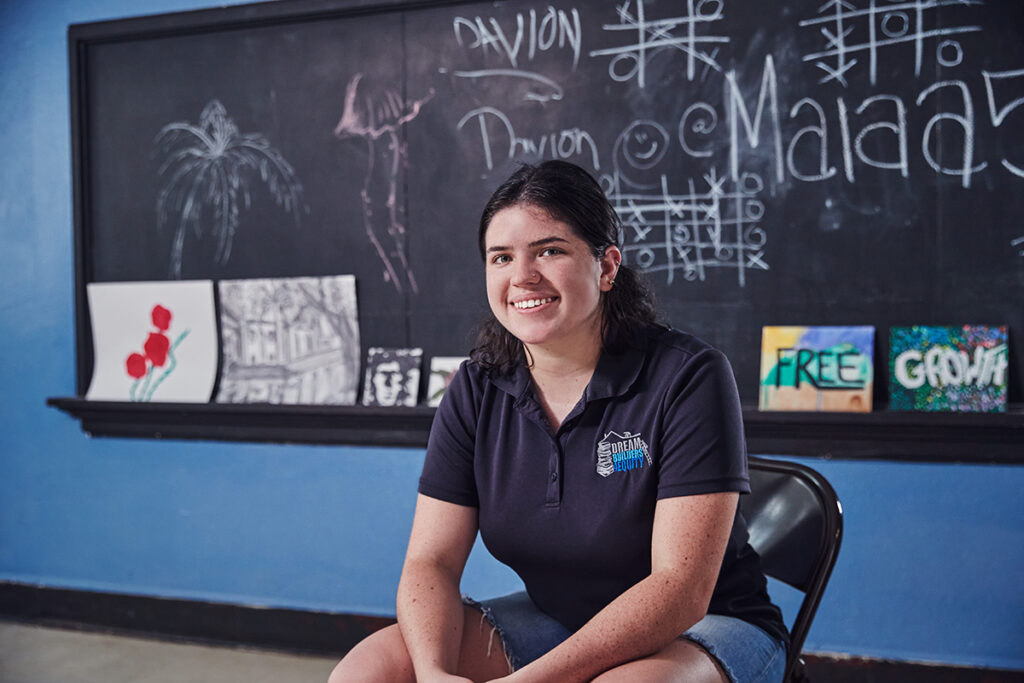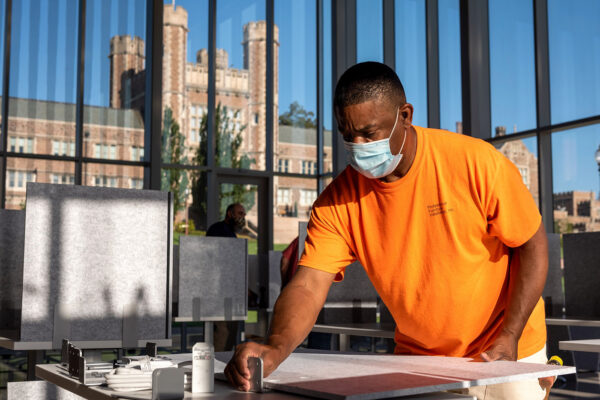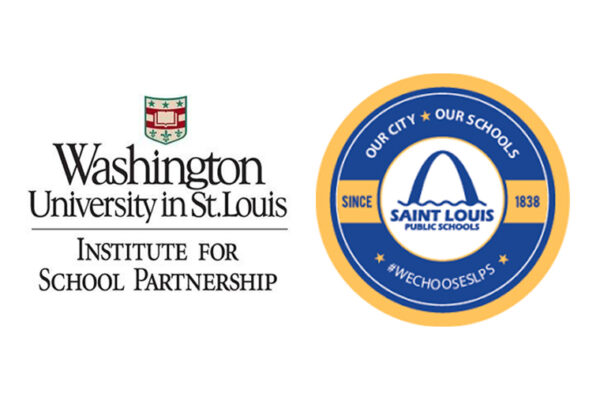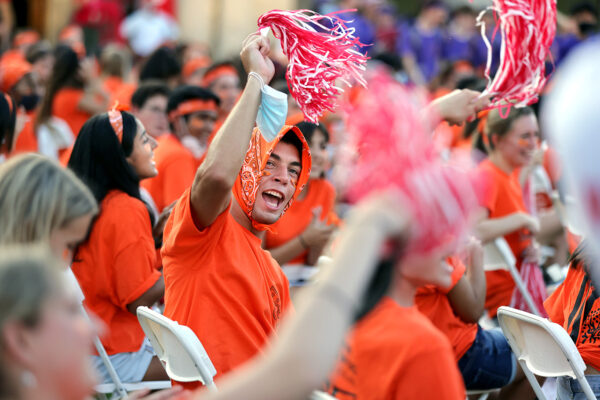Washington University in St. Louis sophomore Aisha Adedayo could not afford an unpaid internship this summer. And Cam Loyet, a 2021 graduate of Olin Business School and founder of Honeymoon Chocolates, could not afford to add payroll to his burgeoning startup.
Still, they had so much to offer each other. Adedayo had energy and an entrepreneurial spirit, while Loyet had experience launching a successful brand.
Enter the St. Louis Entrepreneurial Fellowship, one of 11 Washington University programs that pays students to intern at St. Louis nonprofits, startups and businesses. An initiative of the Skandalaris Center for Interdisciplinary Innovation and Entrepreneurship, the yearlong fellowship provides fellows a $3,000 stipend and free university housing so they can live and learn in St. Louis.
“St. Louis has such a vibrant startup scene, and I got to experience it firsthand,” said Adedayo, who, along with sophomore Gabriela Pedreros, worked at Honeymoon Chocolates’ retail store and commercial kitchen in Clayton. Adedayo, a member of the Beyond Boundaries program, is a student in Olin Business School, as is Pedreros. “I helped increase conversion through conducting email marketing, organizing events, shooting product photographs and redesigning the packaging — basically whatever was needed in the moment.”
This summer, Washington University programs distributed stipends totaling some $625,000 to about 165 students who had unpaid or underpaid internships in the St. Louis region. The students worked in nearly every field, administering medicine to sick animals at the Wildlife Rescue Center, studying drug-delivery systems for med-tech startup UN & UP, directing young actors at the Center of Creative Arts, investigating pollution complaints for the Great Rivers Environmental Law Center, and more.
In addition, the university paid some 4,100 students approximately $27 million in wages for summer internships, fellowships, research positions and other campus jobs. Summer associates in the Office of Sustainability helped plan the university’s transition to EV fleet vehicles; interns in University Marketing & Communications wrote articles for the Record; and summer researchers at the Institute for Public Health conducted pediatric research.
And the Office of Undergraduate Research provided 106 students with $400,000 in grants to conduct independent, faculty-mentored research in St. Louis.
These real-world experiences on and off campus prepare students for future careers, strengthen the St. Louis region and fuel the local economy, said II Luscri, managing director of the Skandalaris Center. He said students who intern in St. Louis are more likely to start their careers here.
“Part of our job at WashU is to help prepare our students to succeed whether that be in their own business, a private company, a nonprofit organization, a government agency or a graduate program,” Luscri said. “We are lucky to be in a region that gives our students so many opportunities to be creative problem solvers. But we also have an obligation to St. Louis. The ‘in St. Louis’ of Washington University in St. Louis matters.”



Supporting the mission
About 43% of internships are unpaid, down only slightly from 49% a decade ago, reports the National Association of Colleges and Employers. Yes, they help students build skills and networks. But only the luckiest students can forgo a paycheck for experiences.
“The reality is many organizations simply cannot afford to hire interns,” said Stephanie Kurtzman, the Peter G. Sortino Executive Director of the Gephardt Institute for Civic and Community Engagement. “At the same time, WashU is becoming more economically diverse. Our challenge is to find creative ways to connect our students, regardless of their financial background, to meaningful career opportunities that help organizations meet their goals.”
Take, for instance, the John C. Morris Fellowship, the Gephardt Institute’s partnership with the Greater Missouri chapter of the Alzheimer’s Association. This summer, the program’s four fellows identified communities in need of services; analyzed new laws for their impact on residents with dementia; and joined meetings with policymakers.
“Would this work get done if they weren’t here? Yes — it has to,” said Sarah Lovegreen, chapter vice president of programs. “But we are able to dig deeper and move faster. The fellows are so bright and insightful. And because of the work of the Gephardt Institute, they come to us with an understanding of nuances of St. Louis, things you’re not going to learn from a tourist guide. That knowledge really helped when working in the community.”



Summer stipends, cohort communities
Washington University has provided stipends for St. Louis internships for well over a decade. The Gephardt Institute started the Goldman Fellows Program in 2008 to support students interested in the nonprofit and public sectors. Since then, about 160 students have served institutions such as the United Way of Greater St. Louis, Operation Food Search, St. Louis County Domestic Violence Court and St. Louis Public Schools.
Meanwhile, the Skandalaris Center has connected students to innovators in St. Louis’ startup scene for nearly two decades. In 2019, the center started the Skandalaris Venture Competition, which provides funding to alumni and student startups and stipends for students who intern at those winning businesses. The next year, it launched the St. Louis Entrepreneurial Fellowship, which, in addition to a summer internship, includes the spring course “Navigating the Startup World,” summer networking events with local founders and a fall capstone project.

Other funding programs include:
- The Career Center Stipend Program, which distributes awards ranging from $1,000 to $3,000 to defray the cost of a summer internship in St. Louis or elsewhere. This year, the Career Center awarded $300,000 in stipends to 162 students, one-third of whom worked in St. Louis.
- The Summer Undergraduate Research Award and Biology Undergraduate Research Award programs, which provide stipends of up to $4,000. This summer, the Office of Undergraduate Research provided grants to 106 students working in St. Louis.
- The Environmental Studies Impact Internship, which awards grants of up to $4,000 to six summer interns who work with community partners.



New programs, broader reach
These successful efforts have spawned a new crop of programs. In 2021, the Career Center started the Chancellor’s Career Fellows program for first-generation and lower-income sophomores. Students take a one-credit course, receive support finding and preparing for their internship and earn a $5,000 stipend.
“These stipends fill the gap, allowing students to accept jobs they couldn’t afford to take otherwise. Every student, not just the well-off or the well-connected, deserves the opportunity to explore different careers and gain important skills,” declared Chancellor Andrew D. Martin when he announced the program.
And this year marked the debut of the George and Carol Bauer Leaders Academy, which features a St. Louis internship component. Sean Spinks, director of the Danforth Scholars Program, said the program includes a $5,000 stipend and helps exceptional scholars become exceptional leaders.
“Our students are phenomenal academically,” Spinks said. “But emotional intelligence and social awareness also are key. These experiences outside of the classroom will help our students better understand how to engage with others and lead.”
In addition, the Gephardt Institute and the Skandalaris Center continue to expand their efforts.
The Gephardt Institute added two initiatives — the aforementioned John C. Morris Fellows Program, named for the former director of the Charles F. and Joanne Knight Alzheimer’s Disease Research Center, and the Arts as Civic Engagement program, which places fellows at four community arts organizations — the Center of Creative Arts, Contemporary Art Museum St. Louis, Griot Museum for Black History and Shakespeare Festival St. Louis.
Gephardt fellows receive a $5,000 summer stipend and an additional $250 to explore all that St. Louis has to offer such as restaurants, festivals and farmer’s markets — a bonus for students and a boost for local businesses. They also participate in about 65 hours of training.
“What started as financial support has evolved into a full curriculum focused on civic change through the lens of St. Louis,” Kurtzman said. “Our fellows come to understand the fabric of St. Louis while also learning about mission-critical priorities of the organizations they serve. They build both career skills and civic leadership skills to affect positive change wherever they go next.”
Kurtzman hopes to grow Gephardt’s stipend program from 22 students this year to 35 students next year and, eventually, 100 students.



Investing in students and St. Louis
The Skandalaris Center has helped develop two new spinoff stipend programs in 2021 — McKelvey’s St. Louis Internship Program for Biomedical Engineers and the Office of the Provost’s Pivot 314 Fellowship Program.
Vijay Ramani, vice provost for graduate education and international affairs, said the Pivot program was designed for doctoral students who want to explore careers beyond academia.
“Universities, especially at the graduate level, have traditionally been focused on research and scholarship, but there has been a recognition that universities can be, as former Provost Holden Thorp wrote, ‘engines of innovation,’” Ramani said. “This program provides a platform for students to consider a future where they can have their own bright ideas and be their own boss. And maybe our fellows will look around and say, ‘You know what? St. Louis is a good place to start my venture.’”
Pivot 314 fellow Alec Beeve, a doctoral candidate in biomedical engineering at McKelvey Engineering, said his internship at Canopy Biosciences in the Cortex Innovation District taught him business skills he would never learn in the classroom.
“Like a lot of students, I had the mindset that academia was a first choice and industry was a second choice. But what I’ve learned is that a lot of people graduate without the necessary skill set to succeed in industry,” Beeve said. “That’s why I wanted to get involved in this fellowship. At Canopy, I’ve seen up close how the product managers fuse their PhD educations in science with their skills in marketing and sales to launch new technologies.”
Beeve said the Washington University stipend made him an attractive candidate to Canopy. Yes, they needed to devote resources to teach, train and mentor him. But they didn’t need to pay him.
“Because WashU is footing the bill, Canopy could afford to take a chance on me,” said Beeve, who plans to stay in St. Louis after he graduates next year. “The fellowship is a great investment in students. And a great investment in St. Louis.”



